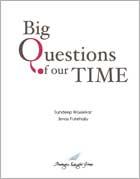Beyond 2012
 |
December, 2009
By Ilmas Futehally
|
At the beginning of every new decade there are predictions of what the world-to-come is going to be like. However with the approach of the new decade this time around, the focus is not so much on 2010, as on 2012. This is mostly because of the recently released film 2012, based loosely on the end of the world prediction of the Mayan Calendar. The 5,125-year-long Mayan Long Count calendar predicts a series of cataclysmic events on 21 December 2012. It is highly unlikely that any such event will take place, but what is certain is that 2012 is going to be a defining year for the coming decade.
In 2012, the next election in the United States will take place. President Obama will be eligible to run for his second and final term, and it is most likely that he will. Whether he wins or not will be an important factor in determining the shape of geo-politics in the next decade. If he does not win the elections, the next government in the US is most likely to be a hard line right wing government, likely to undo many of the actions that President Obama has promised to take in the next few years.
Meanwhile Prime Minister Putin of Russia has announced his decision to run for the Presidency in 2012, a spot that he had to give up to his deputy in 2008 because of a limit of two consecutive terms. If he does run for Presidency again, it is expected that he would remain at the helm from 2012 to 2024, since the term has recently been extended from 4 to 6 years, with exactly this scenario in mind. Thus the leadership in Russia through this decade and half of the next is likely to be predetermined.
In 2012, the Kyoto Protocol on emissions also kicks into effect, with the agreed target an average reduction of 5.2% from 1990 levels. As of November 2009, 187 states have signed and ratified the protocol; the most notable non-member of the Protocol being the United States. However with the United States playing a leading role in the Copenhagen climate talks, this is expected to change. But irrespective of the conclusions at Copenhagen, climate change will be more and more visible in the years beyond 2012.
Green technologies, cleantech and sustainable technologies will be central to economy and industry in the coming decade. In fact the London Olympics to be held in 2012 are expected to be the most green and sustainable games so far. The endeavor is to dramatically reduce both the hardware and the software of the games, in a bid to cut down on emissions.
New technologies are expected to make renewable energy a lot more efficient as well as cost effective. According to futurist Ray Kurzweil, solar power will be cost competitive with fossil fuels by 2013. At present solar energy is only 1% of the total energy consumption, but with nanotechnology getting into the act, the price of solar cells are expected to reduce drastically.
Excitingly, by 2014, Masdar City in Abu Dhabi is scheduled to be completed. This is to be the world�€™s first fully sustainable city. It is to be carbon neutral, as well as zero waste, and is to be the headquarters of the newly established International Renewable Energy Agency (IRENA). This agency has been set up with the objective of rapid transition towards the widespread and sustainable use of renewable energy worldwide.
2015 is perhaps best known as the year in which the Millennium Development Goals (MDGs) are to be achieved if all actors work together. The MDGs cover poverty reduction, education, maternal health, gender equality, and aim at combating child mortality, AIDS and other diseases. However looking at the current rate at which the MDGs are progressing, it is unlikely that they will be achieved, as they have been negatively impacted by the global financial crisis and the food crisis in the last year.
A potentially more successful venture was launched in September 1977. Still in space, after outliving its anticipated lifespan, Voyager 1 is currently the farthest human-made object from Earth, traveling away from both the Earth and the Sun. In 2015, scientists anticipate the craft will reach the heliopause - the boundary that separates Earth's solar system from interstellar space. For the first time in the history of the planet there will be a man made object beyond our own solar system.
Thus the years beyond 2012 are going to be both exciting and challenging. The important question is whether we shall be able to bring about a world where a much larger population can be a part of the excitement, and not dream of the end of the world.
Related Publications
-
.jpg&maxw=50)
Big Questions of Our time: The World Speaks, 2016
Download:Big Questions of Our time: The World Speaks _Full Report
-

-

Second Freedom South Asian Challenge 2005-2025, 2005
read more
Download:Second Freedom South Asian Challenge 2005-2025 Full Report
Related latest News
Related Conferences Reports
-

Global Challenges Conference, October 2016
Download:Global Challenges Conference Report
-

Conference on Responsibility to the Future: Business, Peace and Sustainability, June, 2008
Download:Global Security and Economy: Emerging Issues


